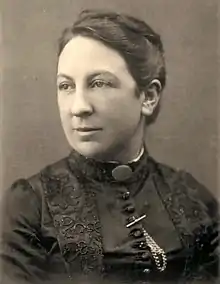Eliza Orme
Eliza Orme, also called Elizabeth Orme (1848 - 1937) was the first woman to earn a law degree in England, from University College London in 1888.[1][2]

Early life
Orme was born in London, into a well-connected middle-class family. She was the seventh of eight children of Charles Orme (c.1807-1893) and Eliza (1816-1892), daughter of Reverend Edward Andrews. Charles Orme was a distiller and her mother had been a governess to Elizabeth Berrett Browning.
Eliza was educated at Bedford College for Women, and attended lectures at University College London from 1871. Her teachers included John Elliot Cairnes (1823–1875), W. Leonard Courtney (1850–1928), and W. A. Hunter (1844–1898). Before the passing of the Sex Disqualification (Removal) Act 1919, women were not permitted to qualify as a barrister or a solicitor in England; indeed, women were permitted to study but not to graduate at many universities.[2]
Career
Taking the advice of John Stuart Mill, a family friend, Orme worked in the chambers of a barrister, John Savill Vaizey, from 1873, but her aspiration to be recognised as a "conveyancer under the bar" was blocked. She established an office on Chancery Lane in 1875 with a friend Mary Richardson, and worked as a "devil", drafting documents for conveyancing counsel and patent agents. She received the degree of LLB from the University of London in 1888. From the mid-1880s, she worked with Reina Emily Lawrence, continuing to work on legal matters until about 1904.[2]
Her office prepared the paperwork for wills, mortgages and property transactions. Patent agency and probate settlements could be undertaken by non-solicitors as they were unregulated.[3] In 1903 Orme was interviewed by the Law Journal, and recounted ‘I “devilled” for about a dozen conveyancing counsel who kept me busily employed on drafts they wanted done in a hurry, and for twenty-five years I found it both an interesting and profitable employment’.[3]
It was only 34 years later that Ivy Williams was called to the bar in England as a first, long after Canada had allowed women with their first lawyer being Clara Brett Martin in 1897.[4]
Politics
Orme was influenced by J. S. Mill, W. A. Hunter, John Elliott Cairnes and Leonard Courtney, all supporters of ''laissez-faire'' and Benthamite reform.[4] She too became active in Liberal Party politics and as a feminist. She was involved with the National Society for Women's Suffrage and the Society for the Promotion of the Employment of Women, and assisted the Royal Commission on labour in 1892. She was also involved with the Women's Liberal Federation from 1887, leaving to join its rival Women's National Liberal Federation in 1892. She met the late nineteenth century English novelist George Gissing in November 1894.[5] She wrote a biography of its founder Lady Fry of Darlington (1898).[2]
In 1902, she wrote the entry for the Dictionary of National Biography for Samuel Plimsoll.[6]
Personal life
She lived for most of her life with her parents in London until their deaths in the 1890s, and then with her sister Beatrice at Tulse Hill. She died in Streatham from heart failure.[2] Her colleague Reina Lawrence was the executor and residuary beneficiary of Orme's will when she died in 1937. They may have had an intimate relationship, referred to as a “Boston marriage”.[7]
See also
- Cornelia Sorabji, first woman to take the Bachelor of Civil Laws exam at Oxford, in 1892
- Gwyneth Bebb, died in 1921 before qualifying as a barrister
- Ivy Williams, first woman called to the English bar in 1922
References
- https://first100years.org.uk/eliza-orme-2/
- Howsam, Leslie (2004). "Elizabeth Orme". Oxford Dictionary of National Biography. Oxford University Press. doi:10.1093/ref:odnb/37825.
- "Eliza Orme | Inner Temple". 2019-12-04. Retrieved 2020-12-26.
- Howsam, Leslie (1989). ""Sound-Minded Women": Eliza Orme and the study and practice of law in Late-Victorian England". Atlantis. 15 (1): 45–55.
- Coustillas, Pierre ed. The Letters of George Gissing, vol.1, p.xii.
- "Archived copy". Archived from the original on 2015-09-24. Retrieved 2015-08-10.CS1 maint: archived copy as title (link)
- Mossm, Mary Jane (2016). "Precedents, Patterns and Puzzles: Feminist Reflections on the First Women Lawyers". Laws. 5 (4): 39. doi:10.3390/laws5040039.